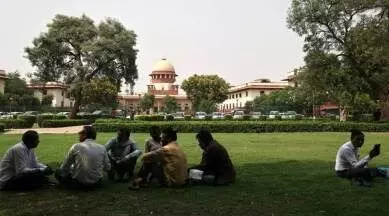
SC reserves judgement on appeals contesting 10% EWS quota set by Centre
text_fieldsNew Delhi: The Supreme Court on Tuesday reserved its judgement on a number of petitions that raised arguments contesting the constitutional validity of the 103rd Constitutional Amendment, which grants members of the forward castes falling under the economically weaker sections (EWS) a 10% reservation in admissions and government jobs.
After hearing from several senior attorneys, including Attorney General K K Venugopal and Solicitor General Tushar Mehta for the government side, in the marathon hearing that lasted six and a half days, a five-judge Constitution bench headed over by Chief Justice Uday Umesh Lalit reserved its decision on the legal question of whether the EWS quota violated the fundamental principles of the Constitution.
Academician Mohan Gopal had opened the arguments in the case before the bench, which also comprised Justices Dinesh Maheshwari, S Ravindra Bhat, Bela M Trivedi, and J B Pardiwala, on September 13 and opposed the EWS quota amendment by terming it as "deceitful and a backdoor attempt" to destroy the concept of reservation.
Senior lawyers including Ravi Verma Kumar, P Wilson, Meenakshi Arora, Sanjay Parikh, and K S Chauhan and advocate Shadan Farasat also assailed the quota, saying it excluded the poor belonging to the Scheduled Castes (SCs), Scheduled Tribes (STs), and Other Backward Classes (OBCs) categories, and defeats the creamy layer concept.
Tamil Nadu, represented by senior advocate Shekhar Naphade, also opposed the EWS quota, saying the economic criteria cannot be the basis for classification and the top court will have to revisit the Indira Sawhney (Mandal) judgement if it decides to uphold this reservation.
On the other hand, the Attorney General and the Solicitor General vehemently defended the amendment, saying the reservation provided under it was different and had been given without disturbing the 50 per cent quota meant for the socially and economically backward classes (SEBC).
Hence, the amended provision does not violate the basic structure of the Constitution, they said.
The SG argued in detail about the state's power to take affirmative action to elevate the poor among the general category and said the constitutional amendment strengthens the basic feature of the Constitution and its validity cannot be tested on grounds of some statistics.
He said the EWS quota was "necessitated" to benefit the general category poor, a "large segment" of the population not covered under any existing reservation scheme.
Senior advocate Gopal Sankaranarayanan, appearing for NGO 'Youth for Equality', supported the EWS quota scheme, contending it was "long overdue" and a "right step in the right direction." The top court heard as many as 40 petitions and most of the pleas, including the lead one filed by 'Janhit Abhiyan' in 2019, challenged the validity of the Constitution Amendment (103rd) Act 2019.
The Central government had filed some petitions seeking the transfer of pending cases, challenging the EWS quota law, from various high courts to the apex court for an authoritative pronouncement.
The bench, on September 8, had framed three broad issues for adjudication arising from the pleas challenging the Centre's decision to grant 10 per cent reservation to EWS in admissions and jobs.
The bench had said the three issues suggested by the attorney general for the decision "broadly" covered all the aspects relating to the petitions on the constitutional validity of the decision to grant the reservation.
The first issue was "whether the 103rd Constitution amendment Act can be said to breach the basic structure of the Constitution by permitting the State to make special provisions, including reservation, based on economic criteria," read the first issue framed.
The second legal question was whether the constitutional amendment could be said to breach the basic structure by permitting the state to make special provisions concerning admissions to private unaided institutions.
Thirdly, the court also identified for adjudication the question "whether the 103rd Constitution amendment can be said to breach the basic structure of the Constitution in excluding the SEBCs/OBCs, SCs/STs from the scope of EWS reservation".
The doctrine of basic structure was propounded by the top court in 1973 while deciding the Keshavananda Bharati case. It was held that Parliament could not amend every bit of the Constitution, and aspects such as rule of law, separation of powers, and judicial freedom formed part of the "basic structure" of the Constitution and hence, could not be amended.
The Centre, through the 103rd Constitutional Amendment Act, 2019, introduced the provision for Economically Weaker Sections (EWS) reservation in admissions and public services.
Earlier, the Centre, in 2019, had also told the apex court that its law, granting a 10-per cent quota for Economically Weaker Sections (EWSs), was brought in to promote "social equality" by providing "equal opportunities in higher education and employment to those who have been excluded by virtue of their economic status".
The Lok Sabha and the Rajya Sabha cleared the bill on January 8 and 9 in 2019 respectively and it was then signed into law by then President Ram Nath Kovind. The EWS quota is over and above the existing 50 per cent reservation to SCs, STs, and Other Backward Classes (OBCs).
With PTI inputs























